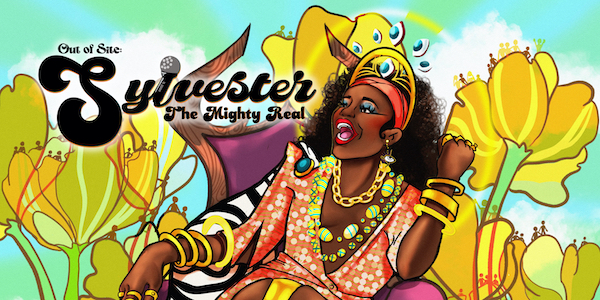
When you hear the name Sylvester, does your mind go to a Puddy Tat or to a bussy tap?
If it’s the former, get ready to be schooled. If it’s the latter, prepare for a thought-provoking dance down memory lane and into the future.
On Friday, August 11, Bay Area theater company Eye Zen Presents will debut “Sylvester: The Mighty Real,” a performance-cum-walking tour that celebrates the life and cultural impact of Sylvester James, Jr., the San Francisco-based dance music diva who boldly demonstrated that flamer and trailblazer are in no way mutually exclusive terms.
“Over the past year,” said producer Seth Eisen, “90% of the times I’ve told people that we were making a show about Sylvester, I’ve gotten a blank stare.
“A large majority of the straight community don’t know him. Among younger queers, there are some people who’ve heard of him, but if I delve into it and ask them to name a song? Usually they can’t.”
Yet Sylvester’s biggest hit, “You Make Me Feel (Mighty Real),” a queer anthem released in 1978, is one of only 625 “culturally, historically or aesthetically significant” audio recordings now included in the Library of Congress’ National Recording Registry (25 are added annually).
In an essay published by the Library in conjunction with the song’s addition to the registry, Joshua Gamson—a University of San Francisco professor and author of the authoritative 2005 biography “The Fabulous Sylvester: The Legend, The Music, The 70s in San Francisco”—wrote:
“Disco was, at its roots, as black and gay as you could possibly get… the collective experience of the dance floor were bodily reminders of freedom: the individual and collective throwing off of stigma, the devotional embrace of strangeness, joy, and queer pleasure, the making of the fantasy self into an actual being. ‘Mighty Real’…was the sound of disco preaching.”
Not a conventional biography
Sylvester, born in Watts, Los Angeles was a campaign ally of Harvey Milk; a staple performer at the Castro Street Fair and San Francisco Pride parades; an unapologetically gay guest on national television talk shows; and an early, steadfast activist for AIDS patients who went on to speak frankly with the press about his own diagnosis at a time when most queer celebrities remained deeply closeted.
“There’s no way to tell all of Sylvester’s story in a one hour and fifteen minute show,” says Eisen. “Maybe it could be done as a television series. But our show was never intended to feel like a biopic.”
Working from a script by local writer and theologian Marvin White and directed by Michael French, each performance of “Mighty Real” features two guide characters who will lead audiences of no more than 35 people on a walk along several blocks of Haight Street where Sylvester lived and spent time beginning in 1970, when he first came to the city and moved into the communal house shared by gay avant-garde theater troupe, the Cockettes.
Among other touchstone locations along the tour are the sites of long-gone gay bars and clubs that once lent Haight Street a sense of queer community very different from that of the Castro.
Between stops, audience members will wear radio-controlled headsets and carefully curated soundtrack including snippets of interviews with friends and colleagues of Sylvester who spent time with him on the very blocks that the tour traverses.
Bridging past and present
“The show isn’t about nostalgia,” says Eisen, “its about connecting the past to the present and hopefully helping make a path to a better future. Sylvester arrived in San Francisco at a moment when the counter culture and queer community were very strong. It was a time where there was a lot of race- and gender- and class-consciousness.
“When you think about what’s happening in our country now, there are a lot of connections. People wanting to be who they are, dress how they want to. What was it like for Sylvester as an out, black genderqueer person to come here and try to figure out ‘Who is my community here? Who are the people who are going to back me in bringing my vision to life?’
“We want audiences to feel like they are following in Sylvester’s footsteps and to think about some of the things he might have been thinking about. The show isn’t about trying to recreate Sylvester; its about conjuring his spirit in his absence and considering how to honor him in this particular space and time.”
Eisen hopes that audience members will come out of the show with a sense of today’s Haight Street as a palimpsest through which both past and present can be considered from fresh perspectives. And while reluctant to reveal some of the show’s surprises, he says that he thinks attendees will find themselves eager to re-listen to Sylvester’s albums or to delve into his music for the first time.
